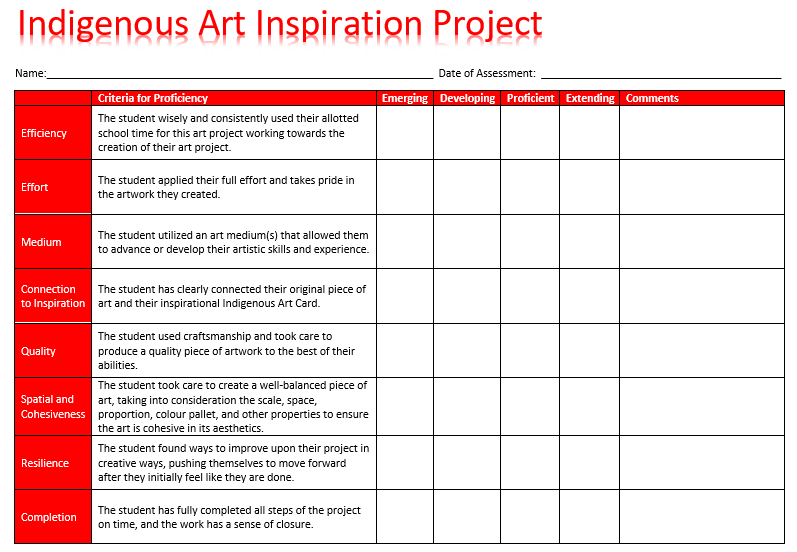Educators implement effective planning, instruction, assessment and reporting practices to create respectful inclusive environments for student learning and development.
Educators have the knowledge and skills to facilitate learning for all students, including learning experiences that reflect individual contexts and local environments. Educators value collaborative practice. Educators recognize and understand the interconnectedness of all aspects of teaching and learning and employ a variety of instructional and assessment strategies. Educators communicate effectively in either English or French. Educators know when to seek support for their practice and for students.
In my final practicum, I finally found a rubric style that I like working with! I applied it twice in my EDUC 491 practicum with the Grade 7 students, once for their Indigenous Art Project and the other for their French Greeting Mini-Book Project.


In my final practicum, I learned a huge lesson regarding the need to unit plan. This was my reflection on my French Formal Observation.
This was an enjoyable lesson to do with the students. It was a real learning opportunity for me, even more than for the students. Early on in my practicum, the Classroom Teacher mentioned a couple of times a “snap” game that the other Teacher Candidate had done in her EDUC 490 practicum. She could probably see that I was struggling more than I knew I was when I first took over teaching Core French. I knew where I wanted to go, but I wasn’t really sure how to get there. In her observation of this lesson, she commented that it would have been helpful to have used these vocabulary words throughout the unit, and she was absolutely right. I just couldn’t see the forest for the trees. The students would have had a much richer learning experience had I known what vocabulary words I was looking for them to use in their mini-books throughout the unit. Instead, I pulled the vocabulary words out of their mini-books at the end of the unit, as words they had used as happenstance in their writing. Usually, my reflections on a lesson are a play-by-play of what happened, but for this one, the real takeaway is that there is a point and an important one as to why unit plans are necessary even when you (AKA – I, Sara McManus) think they are not. Hello, Standard #5… effective planning! “Educators recognize and understand the interconnectedness of all aspects of teaching and learning….” The facts of the matter are simply that I had an idea in my head of the big idea, the content, and what I wanted the students to do to get there. Still, I didn’t take the time and energy to work through how it would be woven together to create the most impactful learning opportunity for the students. If I had started a unit with this set of vocabulary words and allowed the students to play with these words, how much better would their learning outcomes have been after writing their mini-books? I suppose I won’t know. I must accept that at least they had a genuine learning experience of self-discovery, concluding with a solid vocabulary review. Karmic lesson learned through my reflection – Having a well-thought-out unit plan is ESSENTIAL. I don’t want to learn that again on the last day of a unit.
It’s not that I didn’t have an amazing little Mini-books project plan for the French assignment. It was more that I hadn’t stepped back and looked at it through a wider lens.








